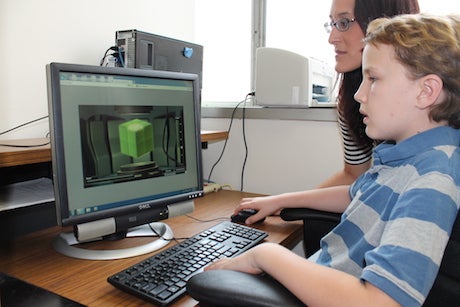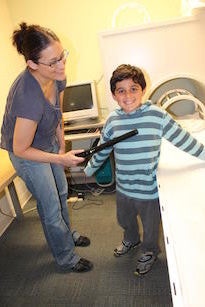Rehabilitation of Cognition in Children and Adolescents After Traumatic Brain Injury
WHAT IS THE PURPOSE OF THE STUDY?
The purpose of this study is to determine whether or not a medication called D-cycloserine (DCS, Seromycin®) improves the effect of a cognitive training program for children and adolescents with moderate to severe traumatic brain injury (TBI). The cognitive training program is designed to improve working memory. Working memory is an ability often needed to complete everyday activities requiring attention and focus. It is the ability to keep information in your mind for several seconds and change it or recall it correctly. You need good working memory in order to learn, solve problems, and control your impulses. Working memory is can sometimes affected in children and adolescents with TBI.
WHY IS THIS STUDY BEING RECOMMENDED TO ME?
Your child was chosen as a potential subject for this study because he/she is between the ages of 11 and 18 and sustained a traumatic brain injury between one to two years ago.
IS MY CHILD ELIGIBLE?

Your child will be considered eligible for this study if he/she:
- Sustained a moderate to severe traumatic brain injury
- Is between 12 and 24 months out from his/her injury
- Is between 11 and 18 years old
- Has a weakness in working memory (we will test this for you)
- Has a good visual acuity or vision corrected with contact lenses
- Speaks English well enough to understand instructions during the study
However, your child will not be considered eligible for this study if he/she has any of the following: - History of major neurological illness, psychiatric disorder, or substance abuse prior to the head injury
- Motor difficulties that impair him/her from participating in the study tasks
- Metal implants or devices that preclude an MRI exam
WILL MY CHILD GET MEDICATION?
Half of the participants will be randomly chosen to receive the medication D-cycloserine in addition to the working memory program, while the other group will receive an inactive pill (placebo). All children will receive the working memory training, but your child may or may not be assigned to take the medication.
WHAT DOES THE STUDY INVOLVE?

The study involves the participation of parents as well as the child.
First, we will screen your child for any working memory weaknesses and determine your eligibility. Second, your child will complete behavioral and brain imaging exams. Third, we will introduce you to the working-memory training program, which you and your child will complete at home. Your child will also begin taking the medication at this time. At the end of the 6-week training program, you and your child will again complete behavioral and brain imaging exams. Three months later, you and your child will come back to UCLA to check on your child’s working memory by completing the same behavioral exams.
Some visits may take up to an entire day to complete.
HOW COULD THIS BE HELPFUL TO MY CHILD?
1) The training may improve your child’s working memory skills.
2) The neuropsychological evaluation and the clinical report you receive will be helpful for treatment and educational planning (e.g., return to school).
3) The project clinicians will be available to consult with you regarding any difficulties your child may be having and make appropriate referrals.
WILL MY CHILD BE PAID FOR PARTICIPATING?
Your child may receive up to $490 is he/she completes the study.
HOW CAN I SIGN UP FOR MY CHILD TO PARTICIPATE IN THE STUDY?
If you are interested in this research study, please contact Alma Martinez:
(310) 825-0443 aamartinez@mednet.ucla.edu.
We will ask you some questions about your child’s injury and get permission to review his/her medical records to confirm he/she had the right type of injury to qualify for this study. If so we will schedule an appointment for a screening. Afterwards, if your child is eligible for the study and you would like him/her to participate, we will ask that you provide your written consent by signing a form prior to their participation. Once you have given your consent, your child will have to give consent by signing an assent form. Projects staff will be present to give you and your child information concerning the study that may be helpful to you.
WILL THE INFORMATION I SHARE WITH YOU BE KEPT PRIVATE?
The only people who will know that your child is a research subject are members of the research team. No information about your child provided by you or your child will be disclosed to others, including other family members or your primary care physician, without your written permission, except if necessary to prevent serious harm to your child.

